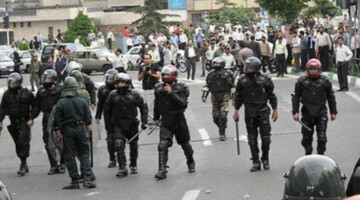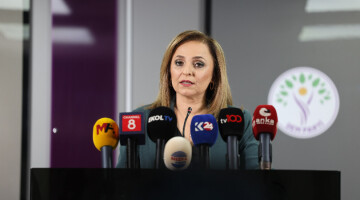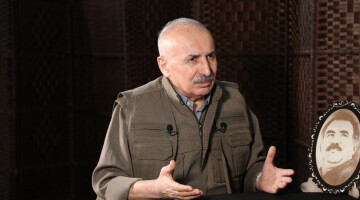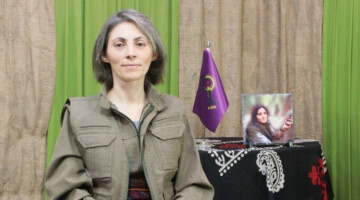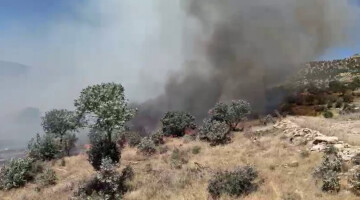Judge Essa Moosa from South Africa stated that PKK leader Abdullah Öcalan is the undisputed leader of the majority of the Kurdish people particularly in Turkey but generally in the Middle East and the diaspora.
Moosa pointed out that the resolution of the conflict in Turkey, Iraq and Syria through dialogue and negotiations may offer the Kurdish people an opportunity to assert their right to self-determination not only in those countries but also in Iran.
Essa Moosa was one of the lawyers of legendary South African Leader Nelson Mandela. A lawyer for more than 40 years, and a a political activist against the Apartheid-Regime, Moosa was the secretary of the ANC Constitutional Committee, which was involved in the research and preparation of the new democratic constitution for the new South Africa in the early 1990’s during the negotiations from apartheid to democracy. After the ANC was elected in 1994, he was appointed as a policy consultant in the department of justice in order to reform the legal system in accordance with the values and principles of the new democratic Constitution. In 1997 Essa Moosa co-formed the Kurdish Human Right Action Group (KHRAG). He was a member of international delegation of human rights lawyers which was mandated to look at the human right abuse of the Kurdish people and the conditions of imprisonment of Abdullah Ocalan.
Judge Moosa spoke to ANF English service regarding the recent developments in Kurdistan and the Middle East.
When did you have direct or indirect contact with Mr Ocalan?
It was in 1997 when a delegation of the Kurdish leadership from the diaspora of Europe visited South Africa to seek political asylum for Mr Abdullah Ocalan. At the time his organisation, the PKK and he was banned in Turkey. He together with some of the leadership of PKK went into exile to continue the struggle of the Kurdish people for the right to self-determination. Ocalan eventually landed up in Europe. Because of the influence of the Turkish government on the European countries, Ocalan was refused political asylum in the European countries. The delegation sought and obtained the assurance from the Nelson Mandela government that should Ocalan find his way to South Africa, he would be granted political asylum. I and other prominent South Africans who were instrumental in securing the assurance of the Mandela government for his political asylum then formed a Committee to Welcome Ocalan to South Africa.
The strategy devised by the Committee in consultation with the Kurdish Delegation was for Ocalan to find his way to South Africa. For security reasons, it was decided that he will not find his way directly from Europe to South Africa. It was planned that he will make his way first to Namibia and then slip into South Africa from there as the two countries have a common border. While on his way to South Africa, he was abducted on 15 February 1999 by certain foreign intelligence agencies in Kenya and handed over to the Turkish military authorities. In Turkey he was charged with treason, convicted and sentenced to death. The sentence was subsequently commuted to life imprisonment. He is presently serving his sentence on an Island in Turkey called Imrali.
As Mr. Mandela’s lawyer and someone following Mr Ocalan’s case, what kind of a picture comes out when you compare the cases of the two leaders?
I followed Ocalan’s case since his unlawful arrest and detention in February 1999. He was charged before a semi-military court in Turkey. It was unlawful for a civilian to be charged before such court in terms of the European Human Rights Charter. Ocalan appealed to the European Court of Human Rights on a number of grounds, which inter alia, were, firstly, that the entire judicial process was tinged with illegality as his arrest and detention was preceded by an unlawful conduct, namely that he was forcefully detained, blindfolded and abducted from a foreign jurisdiction and handed unlawfully to the Turkish military authorities; secondly, that he was tortured by the Turkish authorities and was refused permission to consult his lawyers; and thirdly, that he had an unfair trial.
I attended the hearing before the Grand Chamber of the European Court of Human Rights in Strasbourg on 9 June 2004. Ocalan was represented by a leading former South Africa lawyer, Advocate Sidney Kentridge QC, who also represented Mandela in a number of his political cases in South Africa in the 1950’s. One of the cases relied on by Kentridge in the Ocalan’s case was a case of the State v Ebrahim, which is reported in the [1991] 4 All South African Law Reports and was decided by the South African Appeal Court. The facts are very similar to the facts in the Ocalan case. Ebrahim was an ANC military operative in exile. He was kidnapped in Swaziland by the apartheid forces, tortured and forcefully brought to South Africa. He was charged with sedition and sentenced to 20 years imprisonment. On appeal, the Supreme Court of Appeal of South Africa found that his abduction, arrest and detention was in breach of international law and accordingly wrongful and unlawful and that that whatever followed was likewise wrongful and unlawful, in other words his trial, his conviction and sentence in South Africa were also wrongful and unlawful. The court set aside his conviction and sentence. He later rose to become the Deputy Minister of Foreign Relations in the ANC government.
The Grand Chamber found firstly, that Turkey had violated the European Convention on Human Rights in a number of respects; secondly, that he had an unfair trial because of a series of irregularities during his arrest, his detention and trial; thirdly, that he was tried and convicted by a court whose independence and impartiality was in doubt; fourthly, that the imposition of the death penalty amounted to torture, inhuman or degrading treatment or punishment. In view of the Grand Chambers findings, it declared that an appropriate way of redressing the violations was for Turkey to have a retrial or a re-opening of the case in principle. The Grand Chamber did not pronounce on Ocalan’s unlawful abduction and detention. It skirted the legal issue.
Mandela like Ocalan fought for the right of self-determination of their people. Mandela led the ANC and Ocalan led the PKK. Both were banned in their country and likewise the organisations which they led. Because their free political activities and that of their organisations were prohibited, they decided to embark on the armed struggle which was permissible in terms of the international law. Both were betrayed by foreign intelligence agencies and arrested. Both were charged with treason and faced the death penalty.
Mandela during his trial made the following statement: “During my lifetime, I have dedicated myself to the struggle of the African people. I have fought against white domination, and I have fought against black domination. I have cherished the ideal of a democratic and free society in which all persons live together in harmony and with equal opportunities. It is an ideal which I hope to live for and achieve. But, if need be, it is an ideal for which I am prepared to die for.”
It is the same ideal which Ocalan cherished and hoped to live for an achieve, But, he, like Mandela, was sentenced to life imprisonment and is serving his sentence on Imrali Island , similar to Robben Island, where Mandela served a major portion of his sentence.
Many circles say Abdullah Ocalan is the Nelson Mandela of the Kurds. Do you agree?
Yes, I agree. Mandela was the undisputed leader of the majority of the oppressed people of South Africa. He served 27 years of his life in prison before he was released. He initiated talks about talks with the apartheid regime from prison. Mandela handed the apartheid government the “Road Map to Peace”. Mandela had a series of meetings in prison with South African National Intelligence Services (NIS). Senior members of the ANC in exile had talks with senior officials of NIS in Lucerne, Switzerland. The stumbling block in the peace process was the President P.W Botha the predecessor of President F.W De Klerk. After Botha was replaced by De Klerk, Mandela was released from prison and then the real negotiations took place between the apartheid forces represented by De Klerk and the anti-apartheid led by Mandela. Following such negotiations, Mandela rose to become the President of the first democratic, post-apartheid South Africa.
Ocalan is the undisputed leader of the majority of the Kurdish people particularly in Turkey but generally in the Middle East and the diaspora. He has already served about 17 years in prison and continues to languish in prison. He initiated talks about talks with the Turkish regime from prison. He handed the Turkish regime the Road Map to Negotiation. He had a series of meetings with Hakan Fidan, the Chief of Turkish Intelligence Services known as MIT. Senior members of PKK had talks with senior members of the Turkish government in Oslo. It appears that the peace process in Turkey has once more stalled. Ocalan has now completely been isolated. He had no contact with his lawyers for a considerable period. The opposition party HDP, representing essentially the Kurdish constituency had acted as the interlocutors between Ocalan and his constituency, namely the Kurdish Democratic Movement which includes the PKK but such contacts had also ceased.
It appears that the stumbling block to the peace process like that of President PW Botha in South Africa, is President Reccep Erdogan. In South Africa genuine negotiations only got off the ground when Botha was replaced by De Klerk both as leader of the ruling governing party, namely the Nationalist Party and as President of South Africa. Is the same fate awaiting President Erdogan as leader of the ruling AKP and as President of Turkey?
During the times of Mr. Mandela’s imprisonment, would you find it realistic that he would go out of prison and become President one day?
Before the ANC and its alliance partners were banned, one of the slogans often repeated at their political meetings was: Freedom during our Lifetime. As a student, I thought it was a pipedream. The apartheid regime was very powerful militarily at the time. No-one initially expected during Mandela’s imprisonment that we would see Mandela go out of prison and become President one day. But as time went on and opposition to the apartheid regime grew exponentially both from inside and outside the country and internationally, with the anti-apartheid movement and with the popularity of Mandela growing, it became a very distinct possibility. The slogan Freedom during our lifetime became a reality during my lifetime. I witnessed the first democratic elections in April 1994 in which the ANC became the ruling party and Mandela as the first President of a democratic South Africa.
Have you ever demanded to visit Mr Ocalan in prison? How do you evaluate his denial of meeting with his lawyers since July 2011?
After the kidnapping of Ocalan, we converted the Welcoming Committee to the Kurdish Human Rights Action Group (KHRAG). The object of KHRAG was to monitor the detention and imprisonment of Ocalan and the human rights violation of the Kurdish people. I was appointed as the chairperson of the organisation and continue to serve in that capacity. My organisation and I made several attempts over the years to visit Ocalan in prison but the Turkish authorities declined such visit. As recent as in July 2014, I was appointed by the International Peace & Reconciliation Initiative (IPRI) to serve on a fact-finding mission to investigate and report on the Peace Process in Turkey concerning the Kurdish issue. We sought to interview Ocalan as he was instrumental in initiating the peace process but the request was turned down. IPRI issued a Report on the Mission without any input by Ocalan. We had interviewed the political parties, both the ruling party and the opposition parties except the MHP which was totally opposed to the peace process in Turkey. At the time all the parties including the AKP were in favour of a negotiated settlement.
On 18 December 2010 the STRUGGLE VETERANS ACTION COMMITTEE awarded Abdullah Ocalan the International Peace Prize. The organisation in a letter dated 23 June 2011 to the Director-General of International Relations and Co-operation of the South African government wrote as follows:
“My organisation has resolved that our Chairperson and Secretary-General personally hand over the award to ABDULLAH OCALAN on the Island of Imrali, Turkey. I have accordingly been instructed by my organisation to approach you, as I hereby do, to obtain the necessary permission from and make the necessary arrangement with the relevant Turkish authorities to enable my organisations to hand over the award to ABDULLAH OCALAN on the Island of Imrali.”
The permission was never received and KHRAG is holding the award in trust until it can be delivered to Abdullah Ocalan either on Imrali Island or on his release. The Citation of the Award reads as follows:
“In recognition of ABDULLAH OCALAN as the committed revolutionary, freedom fighter, visionary and the legitimate leader of the KURDISH people and acknowledging the contribution and sacrifices he made to the struggle of the KURDISH people for liberation, freedom and enjoyment of basic human rights, the STRUGGLE VETERANS ACTION COMMITTEE, representing the the struggle veterans of all the South African liberation movements including the AFRICAN NATIONAL CONGRESS (ANC), PAN-AFRICANIST CONGRESS (PAC) and the AZANAIAN PEOPLES ORGANISATION (AZAPO), do hereby confer on ABDULLAH OCALAN THE UNIVERSAL PEACE AWARD.”
SIGNED: CHAIRPERSON AND SECRETARY-GENERAL
In terms of international law the right for a person to have access to a lawyer to consult with him or her in connection with his case or in connection with the violation of his rights in prison or any other legal matter affecting him or his family is a basic human right. In the case of Ocalan, the state allowed him to consult his lawyers during the peace process. The consultations between him and the lawyers were privileged. One therefore do not know what such consultation entailed. Did such consultation relate to violation of his rights, review of his prison conditions or his right to have access to court in order to enforce his rights or did it relate to the peace process. If it was the former, the denial of his right to have access to his lawyers constituted a violation of his basic human rights in terms of international law and was enforceable in a court of law. If it was the latter i.e. the peace process, and it was granted for political reasons, the government would have a discretion to grant or refuse permission. The refusal of such permission would not necessarily have amounted to a violation of his rights in terms of international law. In my view, it is unlikely that Ocalan rights, since July 2011, were not violated for him not to seek legal advice.
What importance do you think Mr. Ocalan’s ideas have for today’s Middle East?
In view of the turmoil presently in the Middle East created largely by foreign insurgents and mercenaries, it is imperative for peace and stability in the area that a peaceful settlement be negotiated between the genuine people of those countries and not by foreign elements who can only exacerbate the conflict as we have seen in Iraq, Syria, Libya and other countries. The Kurdish people are spread throughout four countries in the Middle East. They are to be found in Turkey, Iraq, Syria and Iran. Ocalan, as I mentioned earlier, is the undisputed leader of majority of the Kurdish people in Turkey. He also commands considerable support amongst the Kurdish people of Syria, Iraq and Iran. Ocalan has committed himself to peace not only in Turkey but also in the rest of the Middle East. He produced the Road Map to Negotiations to resolve the Kurdish issue in Turkey. The principles enshrined in that document can equally be applied to other parts of the Middle East. It has already been applied with relative success in the Kurdish areas of Syria. Ocalan is the only principled leader in the Middle East with the necessary credibility and authority, like Mandela, to negotiate a peaceful resolution to the conflict not only in Turkey but also in the rest of the Middle East. I would appeal to the Turkish government to release Ocalan to enable him to play a meaningful role in finding a permanent solution to the Kurdish issue in Turkey and a permanent peace in the rest of the Middle East through dialogue and negotiations.
How is Mr Ocalan and his cause treated in South Africa?
Mr Ocalan and his cause is well-known in South Africa. South Africa was a country of choice for his political asylum in 1997. The Mandela government agreed to grant him asylum if he found his way to South Africa. KHRAG since the Ocalan’s capture in February 1999 has kept South African informed of the fate of Ocalan with regard to his abduction, detention, trial, conviction and appeal. KHRAG also kept the South African people informed of the conditions of his detention and the violation of his human rights and that of Kurdish people at the hands of the Turkish regime. Because KHRAG kept the Kurdish issue and the imprisonment of Ocalan in the spotlight of the South African population that the South African Struggle Veterans Action Committee in December 2010 awarded Ocalan the Universal Peace Prize as indicated above and two years later the South African Communist Party, an alliance partner of the ruling ANC party granted Ocalan an award for his contribution to the peace process in Turkey.
Does Ocalan’s freedom concern Kurds alone? What could be done in the international arena in this regard?
On the international front the Kurds are well organised particularly in the diaspora of Europe. Over the past few decades since the abduction, arrest and imprisonment of Ocalan, they have organised a series of campaigns, protests marches and demonstrations, hunger strikes and sit-ins in order to highlight the struggle of the Kurdish people in Turkey for freedom and basic human rights and of the imprisonment of Ocalan and calling for his unconditional release. This is not only the struggle of the Kurdish people but also the struggle of all the freedom loving people of the world. In terms of international law, the right to self-determination is a basic human right.
On 10 December 2009 i.e. on international human rights day, KHRAG initiated a million signature campaign for the release of Ocalan from prison. This campaign was formally launch on South African Human’s Right Day of 21 March 2010 in the mother city of Cape Town. In September 2012 the signature campaign was merged with the international signature campaign which was spearheaded jointly with KHRAG by the International Initiative for the Freedom for Abdullah Ocalan – Peace in Kurdistan based in Germany. More than 26 million signatures were collected with the last count early this year. KHRAG regularly published KHRAGNEWS, which made the South African and international public aware of the Kurdish struggle for the right to self-determination, the peace process in Turkey and the imprisonment of Ocalan.
Since the anti-apartheid struggle in Europe, the struggle of the Kurdish people for their freedom and basic human rights in Europe has assumed of equal importance. The socialist and left-wing forces of Europe have actively campaigned for the peaceful resolution of the Kurdish issue in Turkey. This has likewise been the consistent stance of KHRAG since its formation. Because Turkey is a member of the Council of Europe, a number of legal issues affecting the Kurds and Ocalan in Turkey have been taken to and vindicated by the European Court of Human Rights.
In consideration of the increasingly ongoing attacks against the Kurdish people in the four parts of Kurdistan, what do you think the coming period will witness with regard to the struggle of the Kurds?
In 1920 the imperial powers of Britain and France carved up the land of Kurdish people following the demise of the Ottoman Empire in terms of the Sevres Treaty. They summarily annexed these pieces of land to what today is known as Turkey, Iraq, Syria and Iran. In 1924 Turkey adopted a Republican Constitution on the basis of Turkish hegemony. The Constitution violated the provision of the Sevres Treaty, which granted the Kurdish people a measure of autonomy where there is a preponderance of Kurdish people and independence after a year if the majority of the people in those areas wish to become independent of Turkey. Such right of self-determination was approved by the League of Nations the predecessor of the United Nations. The struggle of the Kurdish people in Turkey to enforce their legitimate claim to the right of self-determination in terms of the Sevres Treaty, was met with force, execution, imprisonment, banishment, persecution and repression.
The situation in Iraq and Syria is presently very volatile. Foreign powers such as America, Britain, France, Saudi Arabia, Quatar and Turkey has been involved in an anti-Assad military campaign with their proxies hoping to effect a regime change. Iran has come out in support of the Assad regime and Russia has now joined the fray. The consequence has been that thousands of innocent civilians have been killed, the infra-structure of once a thriving Syria has been destroyed, homes have been destroyed and thousands of Syrians have become refugees. Many of them are trying to find greener pastures in Europe. The European powers involved in the regime change in Syria did not bargain for the mass exodus of the Syrians to Europe. The solution to the Syrian crisis lies with the Syrian people and not in the hands of foreigners and mercenaries. It is important that all the elements of the Syrian population including the Assad regime enter into dialogue and negotiations for the peaceful resolution of the Syrian conflict. It is in the interest of the neighbouring countries including Turkey to encourage such settlement, failing which the conflict will spread to the neighbouring countries destabilizing such countries and which can have dire consequences for them.
The resolution of the conflict in Turkey, Iraq and Syria through dialogue and negotiations may offer the Kurdish people an opportunity to assert their right to self-determination not only in those countries but also in Iran.




